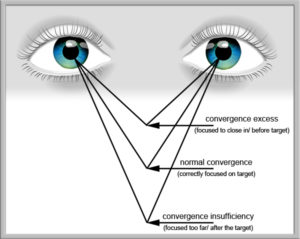Imagine that you are driving in your car and approaching a red light at an intersection. You take your foot off the accelerator and begin breaking in order to come to a complete stop. While waiting for the traffic light to turn green, you see a vehicle approaching you from behind and it doesn’t seem like the vehicle is slowing down. As the vehicle continues to approach your vehicle, you brace for impact and the other vehicle collides with your car. The airbag deploys and impacts your face. Ever since the accident, you experienced headaches, blurred vision, the inability to concentrate, and have memory problems. What could be wrong? It’s possible that you could be suffering from Convergence Insufficiency (CI). Many physicians will not even think of Convergence Insufficiency but will give an initial diagnosis of a concussion.
Physical trauma related to slip-and-fall and car accidents can cause Convergence Insufficiency. It is critical that if you have CI and suffer a physical injury that you hire a personal injury attorney with significant experience representing individuals with Convergence Insufficiency in personal injury matters.

What is Convergence Insufficiency?
CI is a common binocular vision disorder of deficient eye teaming skills. Individuals with CI have difficulty keeping their eyes aligned while performing near tasks. When reading on the computer, it is essential that the eyes work together comfortably to comprehend what is read.
Convergence Insufficiency is the leading visual cause of eyestrain and double vision (diplopia). It is not unusual for a person with CI to close or cover one eye while reading to relieve blurred or double vision.
Symptoms of Convergence Insufficiency
An individual may show and/or experience certain symptoms while reading, working on the computer, working at a desk, playing handheld videogames, and doing crafts.
Symptoms of Convergence Insufficiency include:
- Eyestrain – especially during or after reading
- Headaches
- Blurred Vision
- Double Vision
- Inability to Concentrate
- Short Attention Span
- Frequent loss of Place
- Squinting, Rubbing the Eyes, Closing or Covering an Eye
- Feeling Sleepy During an Activity
- Trouble Remembering What was Read
- Words Appearing to Move, Jump, Swim, or Float
- Problems with Motion Sickness
Many of these symptoms may be intensified by illness, lack of sleep, anxiety, and/or prolonged close work. Convergence Insufficiency may have a significant negative impact on one’s quality of life, potentially interfering with school, work performance, and leisure activities.
To learn more about CI, please seek out a Behavioral Optometrist. If you believe that you suffer from CI, it is critical that you be examined by a medical doctor and optometrist. If your Convergence Insufficiency occurred after a car accident, slip-and-fall, or other events that caused a physical injury, you should consult with an attorney as soon as possible to preserve a successful personal injury claim.
In order for an individual with CI to have a successful personal injury claim, the individual needs the right set of facts and corroborating medical testimony to be fully compensated for his/her injuries.